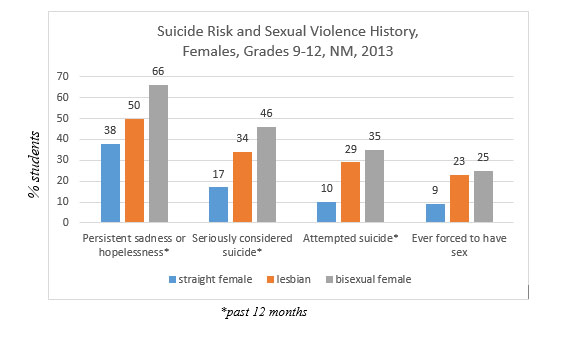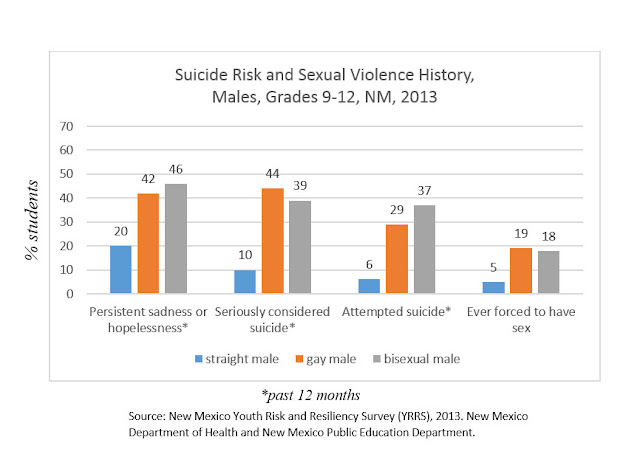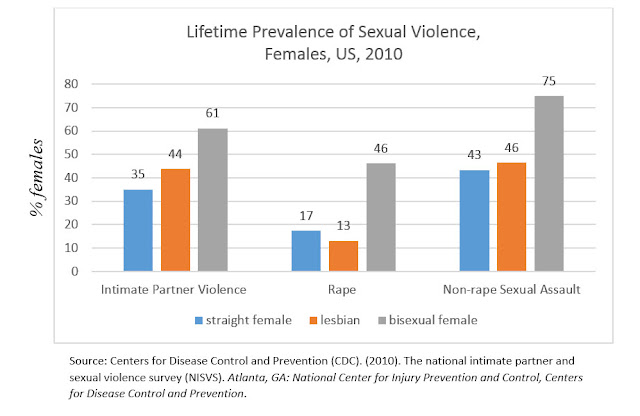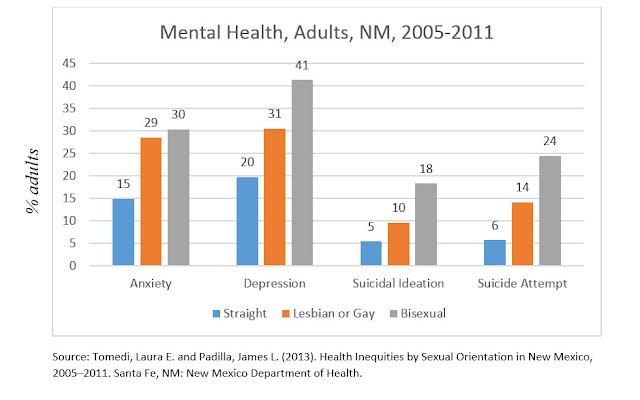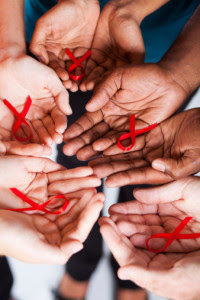Something is going on with the health and well-being of
bisexuals, young and old, in New Mexico and in the United States. State and
national surveys have begun to systematically collect sexual orientation data,
bringing this issue to the attention of public health professionals. This is a great
development for the LGBTQ community. Having data to back up what community
members know anecdotally means that organizations can apply for funding,
develop programs, and support policies to work on very serious issues that
persistently plague the LGBTQ community. New Mexico is ahead of the curve – the
Department of Health started collecting sexual identity data for adults in
2005, well before many other states. We don’t have a lot of gender identity data,
yet. We’re working on it – please believe me - but that’s a discussion for
another time.
The good news is, we now have enough data to look at health
outcomes for LGB adults and youth by distinct sexual orientation, instead of
lumping all of the LGB data together. This is important, because these groups
are different! Different health outcomes, different risk and protective factors,
different strengths, different needs. Members of the LGBTQ community and allies
know this, but until fairly recently, we didn’t have enough data to show it.
Bisexuals make up the majority of the LGB community in NM,
but are often overlooked. Data from the 2013 Youth Risk and Resiliency Survey (YRRS)
– a large survey of middle- and high-school students throughout NM - indicates
that 11.5% of high school girls and 3.5% of high school boys in NM identify as
bisexual, compared to about 3% of girls and boys who identify as lesbian or gay.
(1) These data, as well as national data, indicate that bisexuals, especially
bisexual women and girls, are more likely than their straight OR LGB peers to
have been victims of violence, have poor mental health, and engage in risky
health behaviors. Here are some “highlights” from the 2013 YRRS – fair warning,
they’re not encouraging.
I wish I could say that “it gets better,” but data for
adults don’t really support that notion. Nearly half of adult bisexual women in
the US report having been raped in their lifetime, 61% of bisexual women and
37% of bisexual men have experienced intimate partner violence, and a staggering
three quarters of bisexual women and nearly half of bisexual men have
experienced non-rape sexual assault. (2)
Nearly a quarter of bisexual adults reported having attempted suicide, which was four times the rate of straight adults and nearly twice the rate of gay and lesbian adults. Bisexual adults were more likely to report persistent poor physical or mental health than straight or lesbian and gay adults, and are more likely to smoke than straight adults. (3)
What is causing these health disparities for bisexuals? One last
statistic, indicates that bisexual adults were less likely than lesbian, gay,
or straight adults to report r or to receive the emotional support they needed.
(3) These data confirm what many people in the community know – bisexuals often
face stigmatization and exclusion from both the straight AND the LGBTQ
community. In their report “Supporting and Caring for Our Bisexual Youth,” the
Human Rights Campaign (HRC) notes that “…bisexual
youth reported lower levels than their gay and lesbian peers of family
acceptance and knowledge of and access to social support systems…bisexual youth
were much less likely to be aware of safe spaces for LGBT youth in their
community, or to know a supportive adult in their family, school, or community
whom they could turn to for support. Bisexual youth were also slightly less
likely than gay and lesbian youth to know whether their state government,
doctors, or local businesses were accepting of LGBT people. In short, bisexual
youth often struggle with their sexual orientation and frequently feel like
they have no one to turn to for help.” The same report notes that bisexual
youth were also much less likely to be out to their families, friends, peers,
and communities. (4)
What’s the connection? We know that social isolation can
contribute to poor mental health outcomes, as well as to substance abuse. It’s
possible that young people without a strong social support network are more
vulnerable to sexual violence and bullying, which is also associated with poor
mental health outcomes and high rates of substance abuse. Another factor may be
the lack of visibility surrounding bisexuals, and a lack of understanding of
bisexuality in general. HRC notes that “myths,
stereotypes, and stigma surrounding bisexuals contribute to a unique set of
challenges faced by bisexual youth.” (4)
Let’s move from data to action! What can we do? Here’s are a
few suggestions from HRC for people who work with the LGBTQ community.
What We Can Do:
• Acknowledge
and talk about bisexuality, particularly when talking about topics like dating,
relationships or sex
• Strive to be as inclusive as possible by using terms like “LGBT” when referring to the
community, rather than talking about “gay” rights
• When organizing events, be intentional about including
and identifying openly bisexual participants and leaders, and include content
specifically related to bisexuality
• Show bisexual youth examples of successful people who
identify like they do
• Hold ourselves and other members of the LGBTQ community accountable for
biphobia, for addressing the disparate needs of the bisexual community, and for
making sure that bisexual youth and adults never feel marginalized, dismissed
or stereotyped (4)
Organizations such as Fierce Pride are bringing the
unique strengths and challenges of the bisexual community to light. Awareness
and inclusion are positive steps towards making sure that bisexuals have the
support that they need to be healthy – and it has to start from within the
LGBTQ community.
Post written by:
Danielle Reed
Sexual Violence
Epidemiologist/Evaluator
Office of Injury Prevention
NM Department of Health
(1)
New Mexico Youth Risk and Resiliency Survey
(YRRS), 2013. New Mexico Department of Health and New Mexico Public Education
Department.
(2)
Centers for Disease Control and Prevention (CDC). (2010). The
national intimate partner and sexual violence survey (NISVS). Atlanta, GA:
National Center for Injury Prevention and Control, Centers for Disease Control
and Prevention.
(3)
Tomedi, Laura E. and Padilla, James L. (2013).
Health Inequities by Sexual Orientation in New Mexico, 2005–2011. Santa Fe, NM:
New Mexico Department of Health.(4)
Andre, A., Brown, J., Delpercio, A., Kahn, E., Nicoll, A., and Sherouse, B.
(2014). Supporting and Caring for Our Bisexual Youth. Washington, D.C.: Human
Rights Campaign Foundation.
